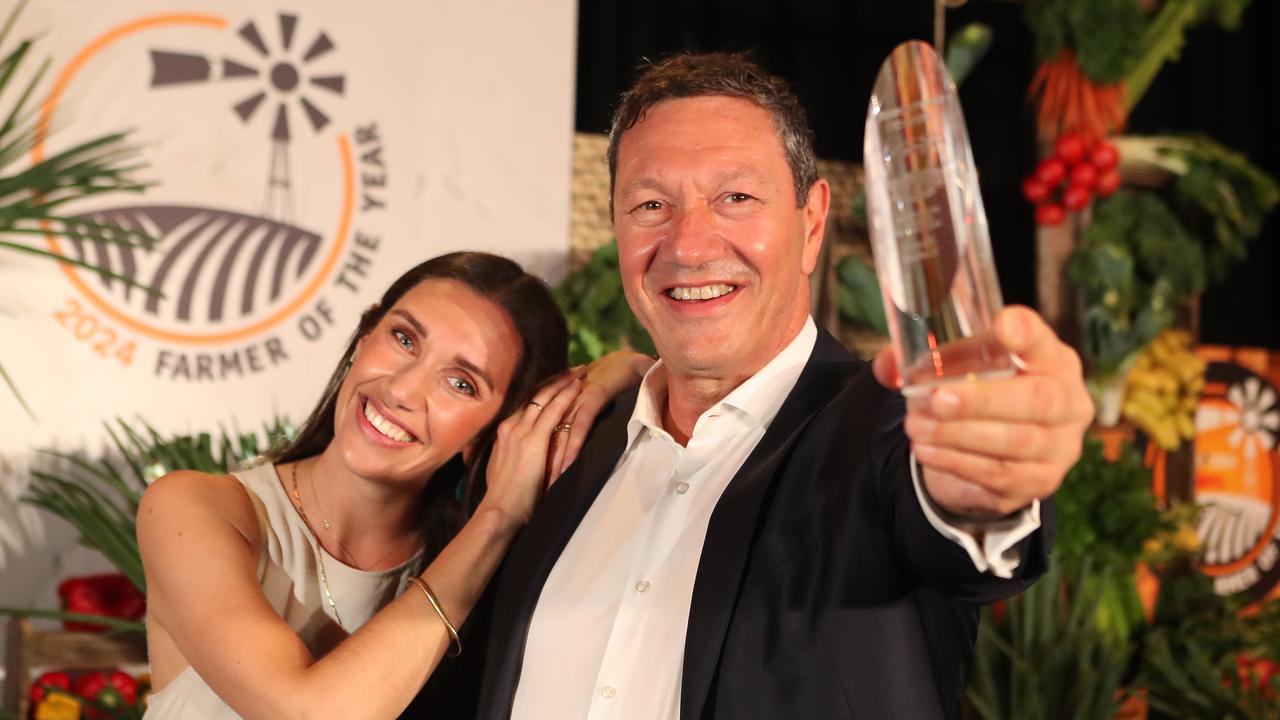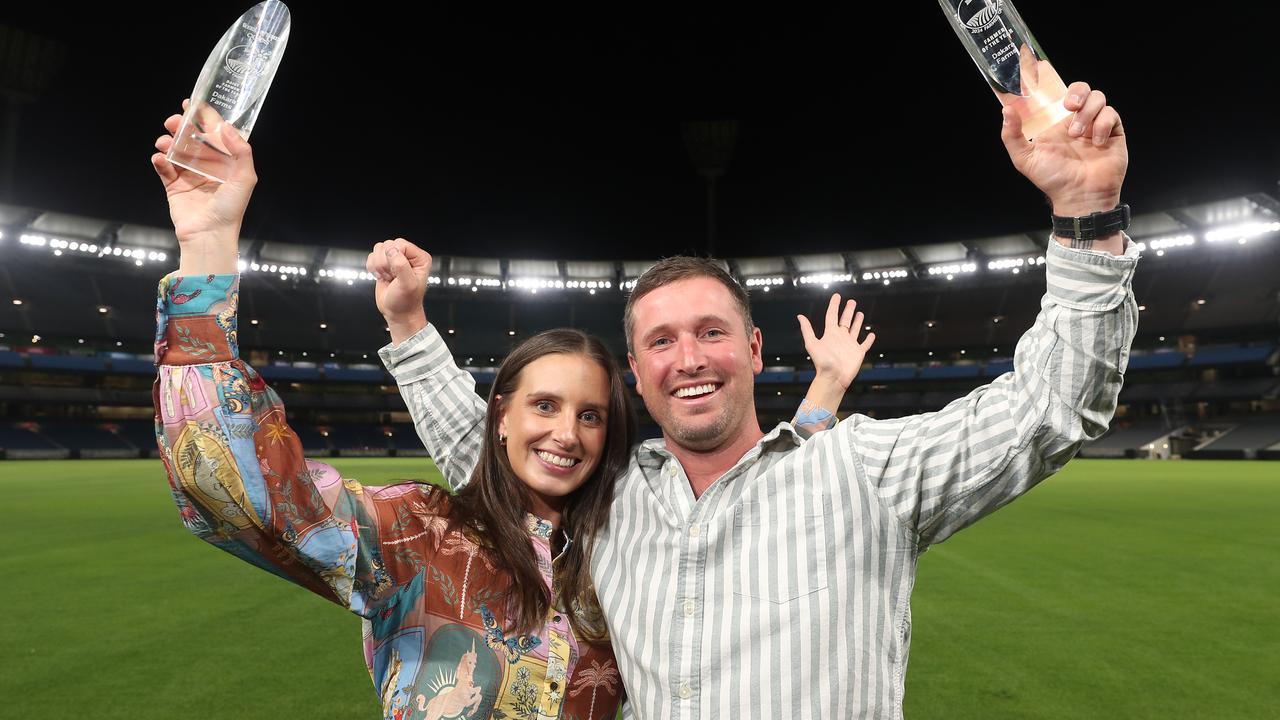Mick and Paula Hughes win The Weekly Times Coles 2019 Dairy Farmer of the Year
Mick and Paula Hughes have taken out top honours for dairy in the Farmer of the Year Awards. See why and meet the finalists here.
AUSTRALIA’S top beef, cropping, dairy, horticulture, innovative and sheep farmers have been recognised at The Weekly Times Coles 2019 Farmer of the Year Awards. The following three growers vied for the title of Dairy Farmer of the Year.
WINNER: MICK AND PAULA HUGHES
INVERLOCH, VIC

ONCE WERE DAIRY WARRIORS
FOR the average morning-and-night dairy farmer, the prospect of a once-a-day milking sounds like agricultural bliss.
For Mick and Paula Hughes, the move to once-a-day milking was a brave leap, but one that is ultimately paying off. The single sessions in the dairy pit have allowed the Hughes to kick numerical goals, with their cost of production as low as $2.60/kg of milk solids. It’s a figure most would give their eye-teeth to achieve.
Cell counts rose from the farm’s former benchmark, but have remained well within supplier Saputo’s premium category.
“We went to once-a-day because it was difficult to find reliable labour with the attention to detail I like,” says Mick, who remains a stickler for quality in the now one-and-a-half-person operation.
“I hated the stress of the last-minute phone calls from people saying they couldn’t come in the morning.”
Now, the couple from Inverloch, in Victoria’s South Gippsland, milk their 500-head herd four days a week, with a casual milker and teenage son Robbie pitching in for the remaining three days. With focus always on the budget and farm profitability, Mick makes the most of his high rainfall and relies primarily on grass to feed the herd.
He developed his own custom breeding program to grow numbers, and follows a strict culling regime, selling any animals that fail to get in calf.
Despite a tough year for most dairy farmers, Mick estimates the cost of production still sits around a respectable $2.96/kg of milk solids — up from their low of 12 months ago.
“I’ve been farming for 30 years or so and the past two years have been the toughest,” he says. “Tougher than the (millennium) drought, tougher than the milk step down (from processor Murray Goulburn). Most dairy farmers will tell you the same thing.”
Mick and Paula may have only one stint in the dairy each morning, but their average workday is no shorter.
“It’s a 3am start. Cups on at 4am. You’re finishing up at 9 to 9.30am. But the working day ends at 6pm,” Mick says. “It’s pretty much on par with most other dairy farmers. It’s just a different way of going about things.”
And that point of difference is truly something to be proud of, and a reason to crown Mick and Paula Hughes winners of The Weekly Times Coles 2019 Dairy Farmer of the Year.
FINALIST: KEELY FAMILY
COHUNA, VIC

NEGOTIATING A WHEY FORWARD WITH WATER
WATER, or the lack of it, may be a hot topic in mainstream conversation at the moment. But it’s something fifth-generation dairy farmer John Keely has always planned for extensively.
Balancing water availability with his pasture production needs is an important consideration for John, and the reason he has been able to keep numbers steady and continue producing quality milk, even in a dry year.
John, wife Michelle, father Des and son Harrison run their 423-hectare dairy enterprise at Cohuna in northern Victoria, where they milk about 310 mostly Holstein cows.
While it’s dairy cattle they are farming, not water, the Keelys have been able to continue their success for five generations – with plans to carry on for their sixth – because they consider water availability when budgeting each year.
John calculates the amount of grass he can grow with the water available each year, to minimise both costs and the need to buy in third-party feed. To set them up, Des was ahead of his time by buying permanent water when water trading began.
“His biggest regret was that he didn’t buy more. It was such a smart move at the time,” John says.
Once the water is worked out, John says their strategy is pretty simple: “grow as much pasture and grass in autumn to graze over winter and store any excess in spring”.
Sustainability is another buzzword bandied about, but the Keelys truly implement it to make sure the next generation takes over a profitable enterprise.
“Our youngest son, Harrison, is home on the farm and wants to milk cows, so (for sustainability for the future generations) it is about managing the situation as best as possible to get through it,” John says.
John took his sustainability endeavours into a recent Nuffield scholarship, where he investigated better ways to use nutrients from manure and effluent generated in intensive dairy operations.
It’s just another practice the Keelys manage on-farm in the hope their success will continue for the next generation and beyond.
FINALIST: FLEURIEU MILK COMPANY
MYPONGA, SA

FLEURIEU SAVOURS THE FLAVOUR
FIGURES alone illustrate the success of Fleurieu Milk Company.
In the space of a couple of years, staff numbers at the family-run dairy farm and milk processing company have increased nearly fourfold, from 15 to 52.
The company – owned by three dairy farmers in the South Australian town of Myponga – has recently completed a $1.2 million upgrade, allowing it to process more than twice as much milk per hour, and package it on-site with a new $260,000 bottling machine.
“Since April 2018 the business has grown 55 per cent,” says general manager Nick Hutchinson, quantifying the rapid success of this cow-to-consumer operation.
Nick’s uncle, and part-owner of the business, Geoff Hutchinson, his wife Louise and dairy mates Barry and Merridie Clarke and Chris and Karen Royans decided to start bottling their own milk 14 years ago.
“I still get up at 4am every day to milk,” Geoff says. “Creating this company has allowed us to still be dairy farmers, which is important at a time when most are battling.”
Nick says the plant is now about 20 times the footprint it was in 2006.
Geoff and Chris sharefarm a herd of 330 Holsteins, while Barry farms 270 Jerseys on 130 hectares.
Given the growth, extra supply comes from three other farms, making Fleurieu Milk’s total production more than 7.5 million litres a year.
Its product range, which includes yoghurt and flavoured milk, is sold in South Australia and exported to Asia.
Nick says Fleurieu Milk has been in charge of its production chain for the past two years, which “has given us complete control over our product and quality”.
Herd quality is their secret to success, according to Geoff.
Each year he uses artificial insemination and embryo transfer, with embryos imported from around the world.
A new $1.1 million, 15-a-side double rapid exit herringbone dairy is one of the most recent additions, and just in case they ever turn to tourism, the new dairy has room for a viewing area and cafe.
“Everything we do is looking one step ahead,” Geoff says.
And whey in front of the competition.
MORE WINNERS:


